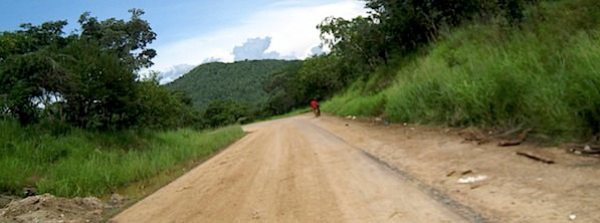Some Days Are Best Forgotten.
I know many readers of my WorldRider adventures and discoveries secretly or overtly wish they were in my shoes. The romance of exotic places, the lure of unique cultures and the carefree wandering across varied landscapes. I know. I dreamed about doing this trip for many years. However, sometimes it just isn’t what it’s cut out to be. Take today for example.
With my business finished in Lusaka, Zambia’s capital city I avoided the raucous rumblings and traveler chit-chat at the ChaChaCha Backpacker’s bar and hit the sack by 9:30 last night, a solid plan so I could easily rise for a 6am pack and 7am departure. Today’s ride would take more than 8 hours to cover nearly 400 miles. Before crawling under my mosquito net the four Norwegian nurses who were bunking in the hut next to mine, and who strongly suggested that Norway should be on the WorldRider route and itinerary, so much that they gave me some of Norway’s finest chocolate and a deck of cards each with a different scenic picture of their country, confided with me that they each were suffering a bit of a tummy bug that had them taking numbers for the toilets. I suggested it would last a day and they’d be fine. Who am I to suggest. They’re the nurses.
It was about midnight when the toilet called my name. And then about six times during the rainy evening I tromped through the courtyard to the shared bathrooms. I became more and more dehydrated. The water I drank went right through me. Fast. And each visit to the bathroom I wondered if this rain would ever stop. Although I’ve ridden in so much rain, I never get used to it.
I was packing before 6am and securing the dry bags to the bike by 6:30. And then I had to secure that damn tire. I said to myself after carrying a rear tire from San Diego to Guatemala City that I’d never do it again. But the luck I had in finding perfectly matched tires in Lusaka meant I couldn’t pass the opportunity. Might never find tires again, especially given Kenya’s turmoil, I might not make it to Nairobi, which of any place would be the most likely to stock tires for Doc.
When pulling the finally bungy cord tight I stepped back and then smack into a puddle, soaking my foot and sock. With all my clothes packed and secured on the bike and the rain pouring down I decided to wring the sock out and just bear with the wet foot. Bad idea. Cause later that evening after checking into my hotel, the wet sock had waterlogged the bottom of my foot and with the tight boots and some friction, my foot was raw and wore to the touch. Ouch.
I did look forward to a cup of coffee that morning. The road out of town would pass by Manda Hills Shopping Center, home to two bakery/patisserie coffee shops. Nice idea. Bad timing. They don’t open until 8 or 9am. So I simply continued with the rain pelting my suit and helmet. I was tired, hungry and lacked my morning coffee. Not a terrible problem; just a disappointment.
Fortunately the rain let up after an hour or so into the ride. Passing through Zambia’s greenbelt where agricultural products such as maize, potato, tomato, cotton and more are grown, the rural villages with round thatch roofed huts set around a central living space were seductively scenic and oozed Africa authenticity. Doc was running good, the fork seal performing as it should and the front brake now seemed operating better as the oil must have burned off.
Riding along the main route from Lusaka to Chipata, was much like the ride from Livingstone to the capital. Hundreds of men and boys riding bicycles, children walking in school uniforms, women and young girls with baskets or jugs of water balanced delicately atop their heads while their colorful clothing spoke to my perception of Africa. It’s no wonder the tourism marketing of Zambia use the slogan: Zambia: The Real Africa. One must be careful riding along these roads as the people tend to crowd the sides and overflow into traffic lanes. After all these people live here and most don’t own a motor vehicle. It’s their road.
After passing my twentieth or thirtieth village compound I decided to pull off and meet the people who live here and to satisfy my curiosity as to what was in the tall thin sacks that everyone seemed to have standing by the side of the road. That’s when I met Teresa and Peter, the headman of his village. Like the boys on bicycles days earlier, Teresa and most everyone else roadside was guarding sacks of charcoal. She had been waiting three days for transport to the market in Lusaka. With no regular scheduled transport she hopes an empty truck heading west will stop. She’ll pay Kw10,000 (about $3) for transport for each sack. She consigned the charcoal from other villagers at Kw15,000. In the market in Lusaka she will sell each for Kw45,000. If business is good she can sell the dozen or so sacks in two days. If not, she might be in Lusaka for more than a week. Then she’ll return and do it all over again.
The track to Peter’s home and village.
Peter lives with his wife and daughter in the headman’s “Palace”, as it is referred to by the local village people. Reporting to the Chief of the village, which is made up of seventy of encampments, there’s a headman for each one. And each settlement has anywhere from 50-100 families. As headman, Peter is responsible for record keeping. Births, Deaths. Marriages. And crop data. Peter was as curious about the United States as I was about his village and their system of law, order, commerce and family. “Do you have charcoal for sale in sacks in America?”
He, Teresa and the secretary for this compound, Avarice agreed to let me shoot photos. So I removed my spare rear tire from the bike and pulled out my big camera.
Peter toured me around his Palace compound showing me the round hut used for stores (corn, sweet potatoes, convassa, etc.), the kitchen area and eagerly explaining things as we walked around. “Have you seen these, Allan,” he asked picking up a shallow woven bowl filled with 1 or 2 inch dried dark critters. “They’re caterpillars, and their delicious.” They pick the caterpillars off the trees, boil them in water with salt and then dry them in the sun. It’s a snack. He offers me to try while throwing a few in his mouth. I grab one and bite it in half. Hmmm. Salty. Not bad. But it’s a tough thing to get over. I’m eating a caterpillar.
Peter and his wife in front of their thatched hut which serves as their kitchen – only a small fire pit inside and a few bottles of water on a moist dirt ground.
Teresa sits and waits patiently by the side of the road hoping that one day a truck will transport her and her consigned charcoal to the market in Lusaka – several hours drive away.
Dried caterpillar. Yummy. Peter shows me the snack delicacy of his village.
Sure I’ll try. Never had caterpillar before – let alone a dried one. Hmmm. Salty.
I told Teresa it’d be tough to load all those bags of charcoal on Doc.
After nearly an hour of chatting and wandering around the village I secured the tire back to the bike and bid my new friends farewell.
About twenty minutes later I look in my rear view mirror and notice the tire is gone. Shit. I turned around and rode back to the village, stopping in another small town and creating a bit of a buzz asking if anyone had seen a tire and handing out my Zambia telephone number to half – dozen kids offering a reward if someone finds it and brings it to Chipata, at the border of Malawi. Tall grass on the side of the road made it impossible to find. Plus, I have no idea where it flew off. If could have hit the road and bounced high and down and embankment or in a river. I was screwed. Not only did the tire cost me about $120, the chances of finding another even remotely similar in Malawi or Tanzania are hopeless. I burned up nearly two hours going back and forth looking for that 130/80/17 Dunlop TrailMax. No where.
On the road to Chipata I would have enough gas to get to the first petrol station. But having to retrace my steps and look for the tire meant I was soon on reserve. I found these guys in a small village who sold me 5 liters of petrol for 10,000kw/liter a 2-3,000 premium than normally paid at the pump.
Dejected, pissed at my stupidity and tired and hungry I rode on. The massive flooding that caused 50,000 to be evacuated from Zimbabwe had taken its toll on this part of Zambia too. At many places dirt and mud had washed across the road or left debris that would be traction challenging for someone on two wheels. And where one bridge that had washed away, traffic was diverted over a temporary bridge, but getting to it mean paddling through ugly, slippery and nasty deep mud. And you know me and mud… my heart raced as I made my way through the 500 meter mucky muddy mess.
A bridge washed out and traffic was routed around and over a temporary bridge. The deep thick mud a result of the last three days of rain. A bit nerve racking but I managed with out slipping.
Then I started to get tired. The eyes started drooping and I found myself where I didn’t want to be. On the side of the road. A wake up call. I thought my diarrhea had passed but had a sudden realization when I let a bit of gas out, it wasn’t gas at all. I pulled over. And then was surrounded by the curious eyes of a dozen or more kids. No one asked for money. They just giggled and surrounded me. Since it was easy with no tire to encumber me, I grabbed the camera and started shooting. It made my problems seem a bit lighter. I’ll manage the budget and find a way to buy and get a new tire. The bowel problem will be cured. And with a bit of water and crackers I will ride the next leg awake. Actually, the next 150km were some of the worse potholed muddy mess of a road I’d seen to date. And the attention required to navigate through this obstacle course of a potholed minefield kept my attention and prevented me from dozing.
Where’s my tire?
A bit sympathetic the police were about my tire, at this routine stop they told me they just let cars pass, for the most part, as they don’t want to inconvenience the drivers. Nice.
I rolled into Chipata just as the last bit of sunlight bid the day farewell. And as the only person at Dean’s Hill View Lodge, with my but raw and sore, a near crash experience, my new tire donated to the bush, and the realization that I lost or left behind my Ngepi Baseball Cap and my reading glasses back in Lusaka, I’ve had better days. But here they do have a cold Mosi, will make me a chicken dinner and provide me with a comfy bed and mosquito net.
I just want to forget this day ever happened.
















Leave a Reply
Want to join the discussion?Feel free to contribute!